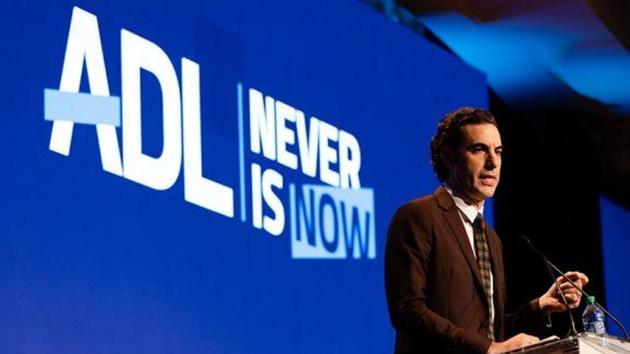Newsmaker: A new and improved Sacha Baron Cohen takes on the ‘Silicon Six’
The actor-director is best known for his rather crass film, Borat. But a recent speech that’s gone viral was an elegant takedown of the billionaires behind our social media platforms, for the damage they’re doing to democracies.
How long would you spend on Twitter, Facebook or YouTube if they were scrubbed of all their absurdity?

It’s a question that worries those running the platforms. And that’s why cats scared of cucumbers coexist with Holocaust denials and statements calling for violence against Muslims / women / sexual minorities / immigrants of colour.
Because if there weren’t enough to retweet, like and rage about, there’s a much greater chance you’d log out. In the real world, this approach of “appealing to our worst instincts” is starting to affect not just how we feel about each other, but also who we elect to office.
That was the crux of actor / director Sacha Baron Cohen’s elegant takedown, recently, of what he calls the Silicon Six. That’s Mark Zuckerberg at Facebook, Sundar Pichai at Google, Larry Page and Sergey Brin at its parent company Alphabet (the duo have since stepped down), Susan Wojcicki at YouTube and Jack Dorsey at Twitter. “The six people who decide what information so much of the world sees.”
In the speech — made on November 23 while accepting the International Leadership Award from the American NGO Anti-Defamation League — Cohen argued that under Facebook’s twisted definitions of free speech, “it would have allowed Hitler to post 30-second ads on his solution to the ‘Jewish problem’”.
It’s a testament to how post-truth an era this is, that a satirist famous for his extreme, in his own words juvenile and puerile, brand of humour is arguing for greater regulation.
THE MAN, THE MOMENT
Sacha Baron Cohen, 48, is a British Jew best known for his movie Borat: Cultural Learnings of America for Make Benefit Glorious Nation of Kazakhstan, a satire in which he played a Kazakh journalist making a documentary about America.
One of his earliest viral moments was a publicity stunt for that film, in which he posed for photographers in an absurd green mankini, at a beach in Cannes.
His recent speech, which he gave as himself (he usually only addresses crowds in character), was reprinted as an op-ed in The Washington Post.
He made the speech at the Anti-Defamation League’s annual Never Is Now summit.
ADL is an American NGO whose stated mission is “to stop the defamation of the Jewish people and to secure justice and fair treatment to all”.
Cohen is best known for co-writing and starring as Borat, in an over-the-top 2006 satirical film about a Kazakhstani journalist making a movie about America. That movie is remembered for its crass, crass jokes and a publicity stunt involving an absurd green mankini.
A British Jew who studied history at Cambridge, he has been an activist since he was a teen. If his movies and TV shows pander to the worst stereotypes, it’s because he uses them to challenge the prejudice at their roots. Taken to their extremes, they force the audience to confront the fact that hateful speech and violent thought can lead to violent action.
“When Borat was able to get an entire bar in Arizona to sing “Throw the Jew down the well,” it did reveal people’s indifference to anti-Semitism,” Cohen said in his recent speech. “When, [in the film Bruno], I started kissing a man in a cage fight in Arkansas, nearly starting a riot, it showed the violent potential of homophobia. And when — disguised as an ultra-woke developer — I proposed building a mosque in one rural community, prompting a resident to proudly admit, “I am racist, against Muslims” — it showed the acceptance of Islamophobia.”
But, Cohen argues, his satire only works because he and his audience have a shared truth. On the multi-billion-dollar platforms run by the Silicon Six, there is no context; no attempt to distinguish opinion from mico-targeted lies. Instead, it’s noise and hate “being facilitated by a handful of internet companies that amount to the greatest propaganda machine in history”.
It’s a fractured kind of propaganda, making it even harder to fight. Because that machine will keep telling you whatever you want to hear, as long as you keep scrolling.
As a result of these platforms, Cohen argues, “democracy, which depends on shared truths, is in retreat, and autocracy, which thrives on shared lies, is on the march”.
Can a bunch of websites really have that kind of impact? Let’s return to Borat. When it became a surprise hit, and the Kazakhstan government realised more people were being introduced to their country through this absurd movie than in any other way, they threatened to sue Cohen. Eventually, instead, they decided to thank him, as tourism numbers rose. It turned out most viewers wanted to visit or know more about the real country.
No one really believed that women in Kazakhstan were used to pull ploughs, or that 13 was considered an advanced age for marriage. The movie, however, was still banned in several countries. Under their laws, it was held accountable for the untruths it was spreading.
Today’s social media platforms are accountable, so far, to no one but their shareholders.
How to moderate the millions of voices they host, all speaking in real time, is not an easy question to answer. But the reason Cohen’s speech has gone viral, is that it’s hard disagree with him when he says it’s time to start asking.






